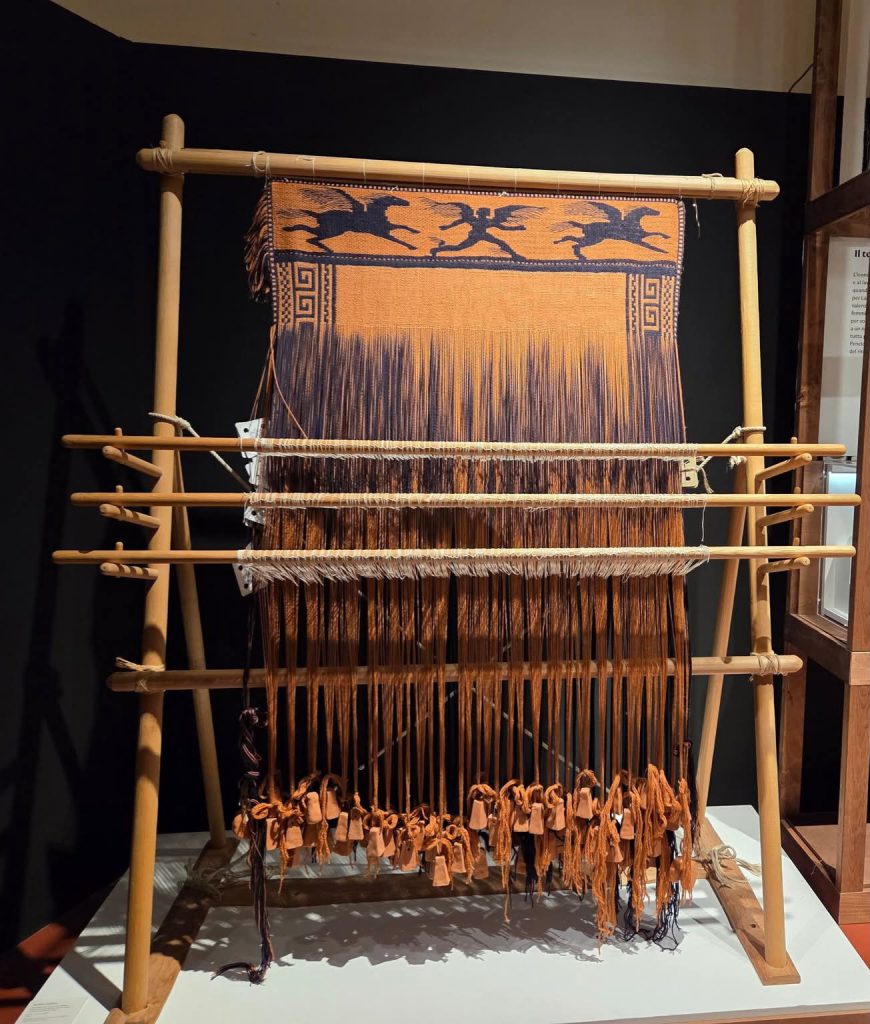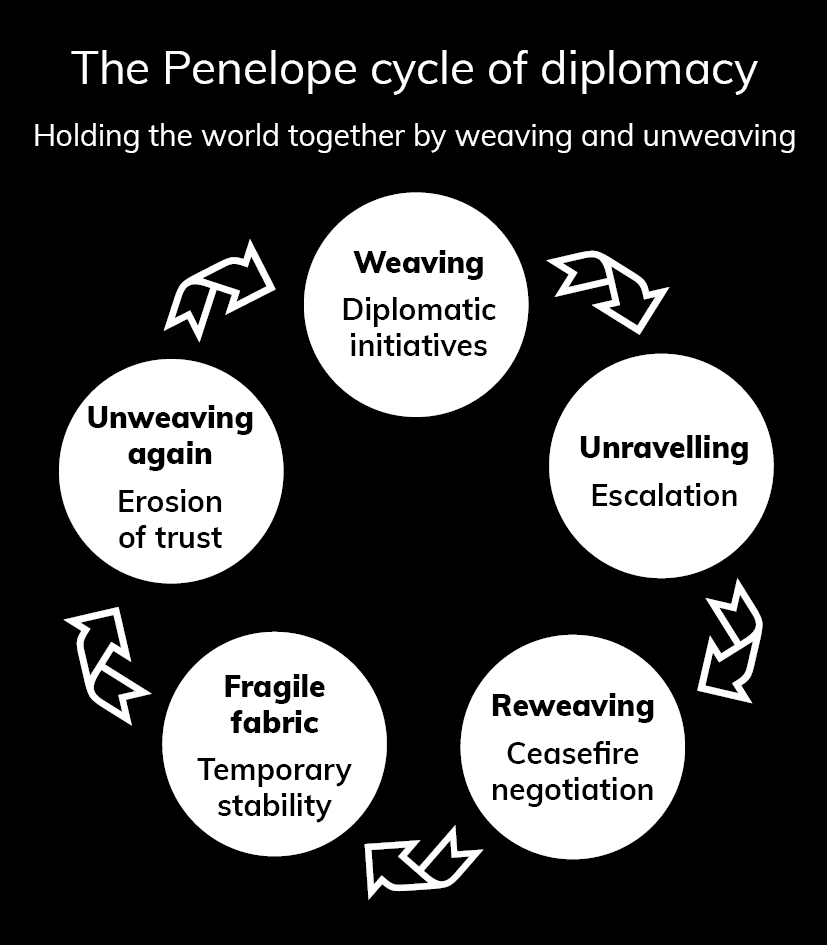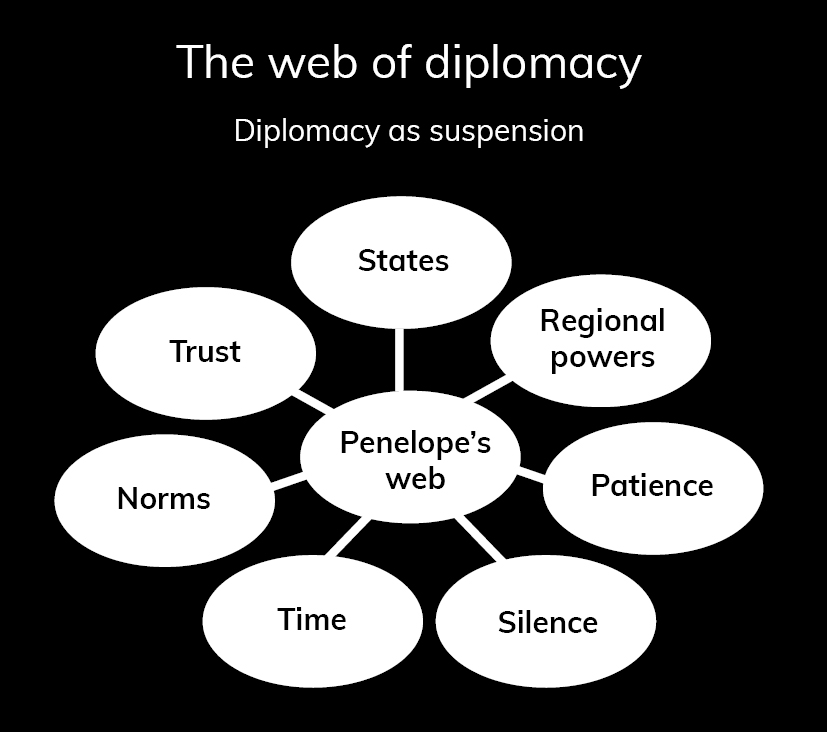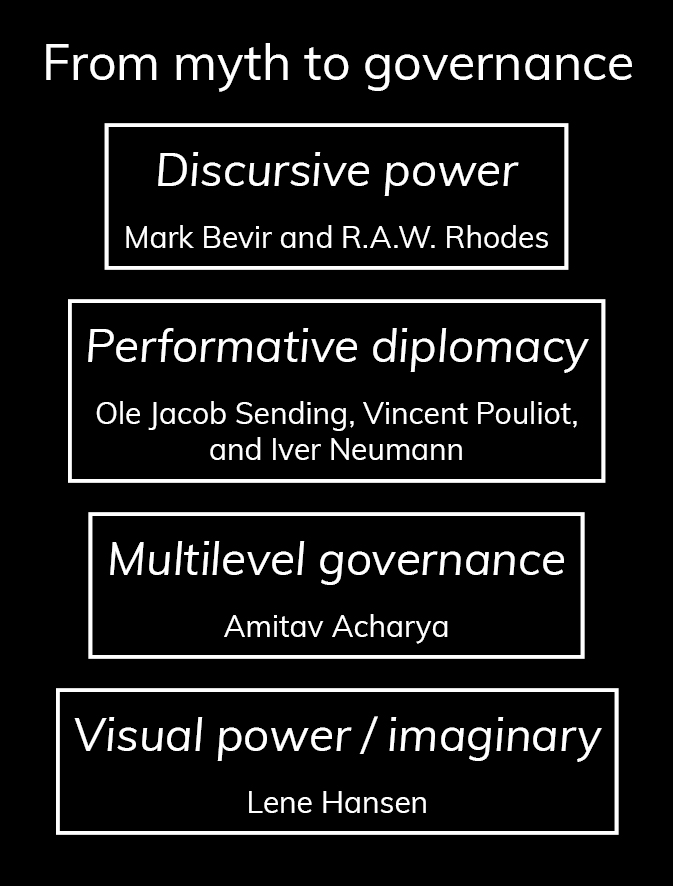Penelope, wife of Odysseus in Homer’s Odyssey, who spent twenty years weaving and unweaving a shroud to delay remarriage and preserve her household, has come to symbolise fidelity, cunning, and endurance. Serena Fraiese argues that her story reveals characteristics that have become central to diplomacy in an age of uncertainty
For centuries, storytellers have portrayed Penelope as the devoted wife who waits; the paragon of constancy. Feminist readings have since turned her into an emblem of resistance and cunning. Yet, as Paul Ricoeur wrote, the myth is a source of meaning that never runs dry. Penelope continues to offer us insights into power, time, and language.

As world leaders weave fragile truces in the Middle East, Penelope has begun to speak to me again with unexpected force.
After visiting an exhibition dedicated to her at the Museo Archeologico Nazionale di Taranto, an exhibit from which is pictured, I felt compelled to rethink Penelope not simply as a symbol of fidelity, but as a political figure.
Photograph by the author
Penelope's web is not merely a sign of love, but an act of politics. Clifford Geertz described culture as a web of meanings spun by humans, within which they are suspended. Penelope weaves to survive, but also to create space. Each day she advances the fabric and each night unravels it, exercising quiet control over her destiny. She does not wait; she acts. She turns constraint into freedom, patience into strategy. Her weaving becomes a politics of time: delaying completion to keep choice alive.
By exercising quiet control over her destiny, Penelope turns constraint into freedom, patience into strategy
In this ancient gesture lies a key to understanding modern diplomacy. International negotiations rarely end in final resolutions; they are continuous acts of weaving, where ambiguity, trust, and reversibility intertwine.

As an old Arabic proverb reminds us, Kalām al-layl yamḥūhu an-nahār – 'The word of the night is erased by the day'. The mediation between Hamas and Israel, brokered by Qatar, Egypt, and the United States, recalls Penelope’s web: a tangle of fragile threads where every actor seeks to buy time, protect interests, and build the appearance of stability.
Qatar offers a bridge between worlds; Egypt defends its centrality in the Mediterranean; the US performs power as much as it exercises it. Israel and Hamas remain in a tactical truce, suspended between necessity and mistrust. Like Penelope’s weaving, diplomacy does not conquer. It holds things together.
Alexander Wendt and Nicholas Onuf taught us that international politics is a discursive construction. Meaning precedes action, and actors operate within shared or contested webs of significance. The myth, from this perspective, is not ornament but a tool of knowledge. To read Penelope is to recognise that diplomacy, too, rests on symbols, language, and interpretation. Patience becomes power; postponement becomes agency. Strength here lies not in command or speed, but in the capacity to endure time and move within it.

Then there is Penelope’s silence, a silence that does not consent but prepares. In international affairs, silence is itself a language: pauses, hesitations, and ambiguities become instruments of influence. Diplomacy often operates through discretion, through the calculated choice not to speak, turning delay into power. Penelope understands this logic; her silence is action, her time is political.
Diplomacy often turns delay into power. Penelope understands this logic; her silence is action, her time is political
The myth also includes the maids, often dismissed as traitors. Yet their gestures reveal the fragility of community itself. Likewise, in international politics, fractures often arise not from enemies but from allies. Cooperative spaces are riddled with subtle tensions, partial loyalties, and interests disguised as values. This is the inner vulnerability of the system: the erosion of trust, the silent betrayal of those who share the same words but hollow them out in practice.

Mark Bevir and R. A. W. Rhodes have shown that political power operates not only through institutions but also through the narratives that give meaning to action. From this view, diplomacy is a symbolic practice that constructs reality rather than merely reacting to it.
Ole Jacob Sending, Vincent Pouliot, and Iver Neumann describe the world as a fabric of performative relations, where power is exercised through gestures and rituals more than through direct coercion. Penelope’s daily weaving anticipates this dimension: her act is a form of performative diplomacy, a silent negotiation between constraint and freedom.
Her web also mirrors what we now call multilevel governance; a system built not through linear decisions but through the plasticity of relationships. Amitav Acharya reminds us that global order is not imposed from above but emerges from the interaction of regional actors who reinterpret norms and practices according to their own logics of legitimacy. Penelope teaches the same lesson: coherence is not born from uniformity, but from the ability to weave differences into a shared fabric.
Penelope teaches us that coherence is not born from uniformity, but from the ability to weave differences into a shared fabric
On a symbolic level, her figure resonates with recent debates on the political imaginary and the visuality of power. Lene Hansen has shown how images and myths are not neutral representations but discursive devices that shape our perceptions of security and legitimacy. Penelope’s web is also this: a visual construction of peace, fragile and reversible, shown to the world by day and undone by night in the corridors of power.
Penelope is no longer the woman who merely resists. She is a universal figure who speaks to us about how politics weaves and reweaves itself. She embodies a diplomacy measured not by victory but by continuity, one that knows the strength of patience and the vulnerability of time. In a world of conflicts and precarious negotiations, her story reminds us that every balance is provisional, every alliance a fabric still in the making.
In Penelope’s patience we glimpse the quiet power of diplomacy itself: not the triumph of resolution, but the art of keeping the world from unravelling. The courage not to win, but to hold the thread when everything else comes undone.